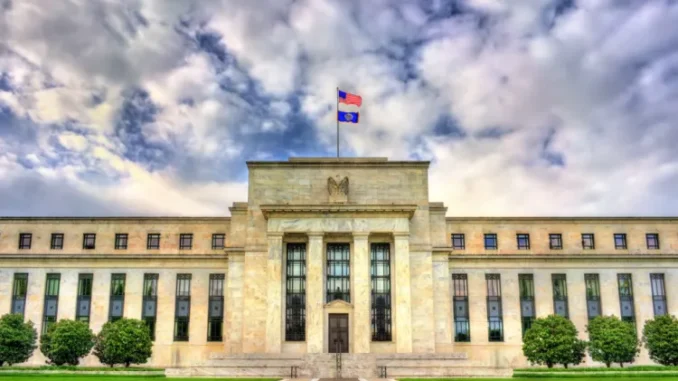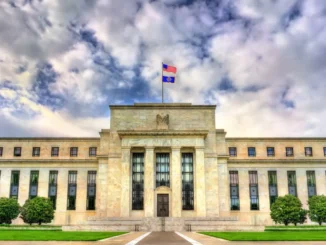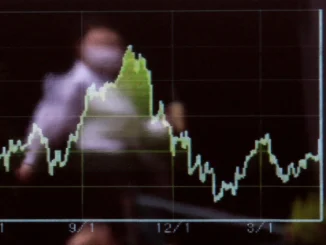
As expected by virtually all market participants, the Federal Reserve maintained its short-term policy interest rate between 5.25% and 5.5% at its June meeting that concluded Wednesday afternoon.
That’s the seventh consecutive time policymakers with the Federal Open Markets Committee (FOMC) kept the rates unchanged, reflecting mixed signals from the leading U.S. economic data. Job creation came in stronger than expected in May, but inflation slowed slightly.
According to the FOMC, “the risks to achieving its employment and inflation goals have moved toward better balance over the past year.” In recent months, there has been “modest” progress toward the 2% inflation target, but the economic outlook is “uncertain,” and the committee remains “highly attentive to inflation risks.”
“The Committee does not expect it will be appropriate to reduce the target range until it has gained greater confidence that inflation is moving sustainably toward 2%,” the FOMC said in a statement. “In addition, the Committee will continue reducing its holdings of Treasury securities and agency debt and agency mortgage‑backed securities.”
For mortgage companies, today’s Fed decision means that rates for home loans will remain at higher levels for longer. Following the release of inflation data on Wednesday morning, the 30-year fixed rate for conforming loans was at 7.18%, according to HousingWire’s Mortgage Rates Center.
All eyes are now on the Fed’s next moves. Officials no longer expect three rate cuts for 2024, as indicated in March. According to new economic projections, 11 policymakers expect no more than one rate cut this year since more evidence of a cooling economy is needed.
The data shows that eight participants estimate a target level for the federal funds rate of 4.875% at the end of 2024, compared to seven participants at 5.125% and four at 5.375%. Overall, the median for the federal funds rate is at 5.1%, compared to 4.6% in March, the new projections show.
Monetary policy watchers believe there is a 91.1% chance of rates staying unchanged in July, along with a 65.4% chance of a rate cut in September, according to the CME FedWatch Tool, which measures the likelihood of changes to rates at upcoming meetings.
Fed officials have consistently stated that economic data drives their decisions.
In May, the U.S. economy added 272,000 jobs, above the market consensus estimate of 180,000, per data released by the U.S. Bureau of Labor Statistics. But the unemployment rate was at 4%, the highest level since January 2022 and up from 3.7% one year earlier.
Meanwhile, the Consumer Price Index (CPI) cooled slightly in May, with the all-items index posting a 3.3% annual increase before seasonal adjustment, down from 3.4% in April. On a month-over-month basis, inflation remained flat, marking the first month without an increase since July 2022. In April, the index posted a month-over-month increase of 0.3%.
Fed officials are expecting higher inflation for 2024 than previously projected. PCE inflation is estimated at 2.6%, higher than 2.4% in March. Core inflation, which excludes food and energy, is estimated at 2.8%, up from 2.6% previously. Unemployment rate expectations remained unchanged at 4% from March to June.
“We need to see more good data to bolster our confidence that inflation is moving sustainably towards 2%,” Fed Chairman Jerome Powell told journalists during a conference on Wednesday afternoon. “It’s going to be not just the inflation rate readings; it’s going to be the totality of the data.”
According to Powell, reducing policy restraint too soon or too much could reverse the progress already made. Meanwhile, waiting too long would impact the U.S. economy.
But if the economy remains solid and inflation persists, Powell said the Fed is ready to “maintain the current range for the overall funds rate as long as appropriate,” adding that there’s no “commitment to a rate path.”
“It’s the full economic picture, not a singular factor, that will guide their decision,” First American deputy chief economist Odeta Kushi said in a statement.
“The FOMC will hold off on making any changes to the federal funds rate until inflation, and the factors that drive inflation, such as a more balanced labor market, make significant and sustained progress toward the Fed’s target, or there’s a significant decline in economic activity or worrisome weakness in the labor market.”
According to Kushi, the FOMC rate announcement itself is unlikely to significantly impact mortgage rates, but a more hawkish tone than markets anticipate can move them up further, or vice versa.
Realtor.com chief economist Danielle Hale said that “there are ample data points for both sides to factor into the debate” of where rates should be.
“Although recent inflation and labor market data have raised questions about whether additional increases in the Fed’s rate are necessary, I still expect the current rate to be sufficiently restrictive to bring inflation back to 2%, and updated economic projections suggest that Fed decision makers agree,” Hale said.
“For home shoppers and sellers, I expect that peak mortgage rates likely remain in the rearview, but volatility remains a risk, complicating moving decisions for home sellers, homebuyers, and renters alike,” she added.
Regarding the housing sector, Powell said that the situation is “complicated” and the best the Fed can do is “bring inflation down,” noting that the country will still have to deal with a housing shortage.
Editor’s note: This is a developing story and will be updated.



